全册人教版八年级下册英语教案
- 格式:doc
- 大小:103.50 KB
- 文档页数:50
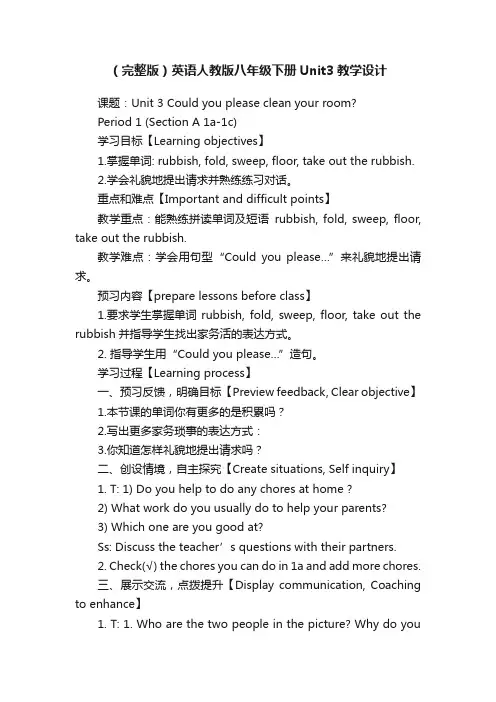
(完整版)英语人教版八年级下册Unit3教学设计课题:Unit 3 Could you please clean your room?Period 1 (Section A 1a-1c)学习目标【Learning objectives】1.掌握单词: rubbish, fold, sweep, floor, take out the rubbish.2.学会礼貌地提出请求并熟练练习对话。
重点和难点【Important and difficult points】教学重点:能熟练拼读单词及短语rubbish, fold, sweep, floor, take out the rubbish.教学难点:学会用句型“Could you please…”来礼貌地提出请求。
预习内容【prepare lessons before class】1.要求学生掌握单词rubbish, fold, sweep, floor, take out the rubbish并指导学生找出家务活的表达方式。
2. 指导学生用“Could you please…”造句。
学习过程【Learning process】一、预习反馈,明确目标【Preview feedback, Clear objective】1.本节课的单词你有更多的是积累吗?2.写出更多家务琐事的表达方式:3.你知道怎样礼貌地提出请求吗?二、创设情境,自主探究【Create situations, Self inquiry】1. T: 1) Do you help to do any chores at home ?2) What work do you usually do to help your parents?3) Which one are you good at?Ss: Discuss the teacher’s questions with their partners.2. Check(√) the chores you can do in 1a and add more chores.三、展示交流,点拨提升【Display communication, Coaching to enhance】1. T: 1. Who are the two people in the picture? Why do yousay so?2. Where are they? How do you know?2. Read the chores and add more chores.3. Use “Could you please…” to make a conversation just like Peter and his mother. 1c.4. Listen to 1b and check their answers.四、师生互动,拓展延伸【Teacher-student interaction, Development】【归纳】Make polite requests. ------ Could you please…? Yes, sure./ OK, but……【拓展】1.Can you do some dishes?2. rubbish的同义词:eg. You do talk rubbish sometimes. 胡言乱语【辨析】1. do 与make2. clean 与sweepeg. Let’s clean the house. You sweep the floor and I wash the dishes.五、达标测评, 巩固提高【Evaluation standards,Consolidation and improvement】基础题I. 根据句意及首字母提示写出单词。
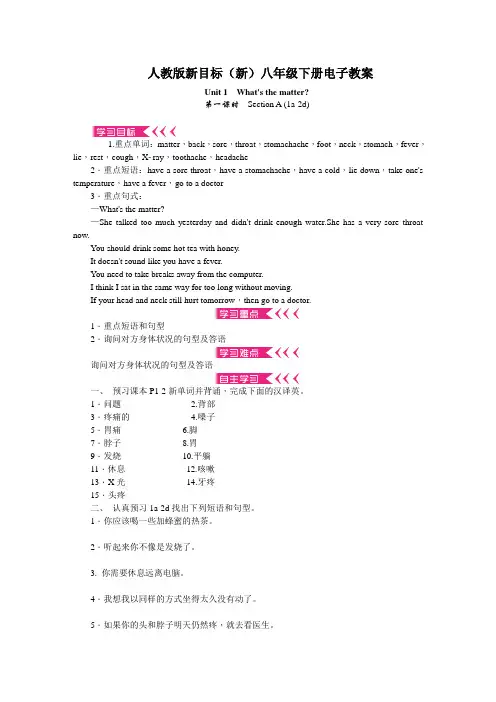
人教版新目标(新)八年级下册电子教案Unit 1What's the matter?第一课时Section A (1a-2d)1.重点单词:matter,back,sore,throat,stomachache,foot,neck,stomach,fever,lie,rest,cough,Xray,toothache,headache2.重点短语:have a sore throat,have a stomachache,have a cold,lie down,take one's temperature,have a fever,go to a doctor3.重点句式:—What's the matter?—She talked too much yesterday and didn't drink enough water.She has a very sore throat now.You should drink some hot tea with honey.It doesn't sound like you have a fever.You need to take breaks away from the computer.I think I sat in the same way for too long without moving.If your head and neck still hurt tomorrow,then go to a doctor.1.重点短语和句型2.询问对方身体状况的句型及答语询问对方身体状况的句型及答语一、预习课本P1-2新单词并背诵,完成下面的汉译英。
1.问题____________ 2.背部____________3.疼痛的____________ 4.嗓子____________5.胃痛____________ 6.脚____________7.脖子____________ 8.胃____________9.发烧____________ 10.平躺____________11.休息____________ 12.咳嗽____________13.X光____________ 14.牙疼____________15.头疼____________二、认真预习1a-2d找出下列短语和句型。
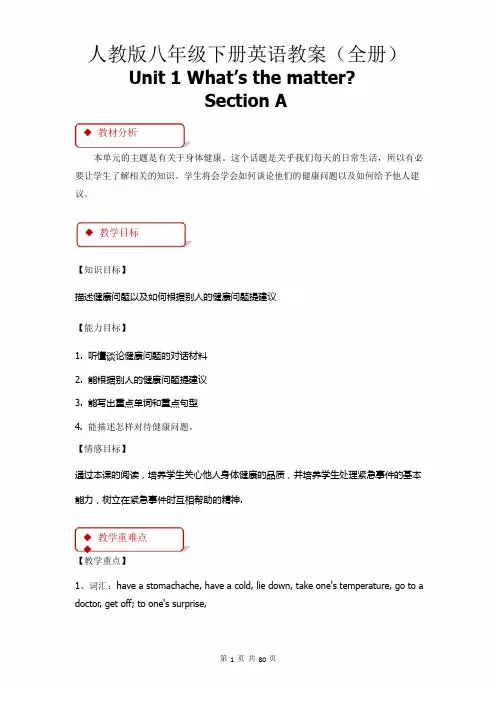
人教版八年级下册英语教案(全册)Unit1What’s the matter?Section A◆教材分析本单元的主题是有关于身体健康。
这个话题是关乎我们每天的日常生活,所以有必要让学生了解相关的知识。
学生将会学会如何谈论他们的健康问题以及如何给予他人建议。
◆教学目标【知识目标】描述健康问题以及如何根据别人的健康问题提建议【能力目标】1.听懂谈论健康问题的对话材料2.能根据别人的健康问题提建议3.能写出重点单词和重点句型4.能描述怎样对待健康问题。
【情感目标】通过本课的阅读,培养学生关心他人身体健康的品质,并培养学生处理紧急事件的基本能力,树立在紧急事件时互相帮助的精神.◆教学重难点◆【教学重点】1、词汇:have a stomachache,have a cold,lie down,take one's temperature,go to a doctor,get off;to one's surprise,2、句型:1.——What's the matter?——I have a stomachache.You shouldn't eat so much next time.2.——What's the matter with Ben?——He hurt himself.He has a sore back.——He should lie down and rest.【教学难点】掌握情态动词should shouldn't.的用法;学习have的用法◆课前准备◆Multimedia,group work,cooperative discussion.◆教学过程Step1.Warm up1.Look at the picture and learn the parts of the body.2.New words and phrases.Step2Presentation1.1aLook at the picture.Write the correct letter[a-m]for each part of the body.Then check the answers.2.1bFirst,lead Ss to read the five names.Then look at the picture.Number the names1-5.’sFinally, check the answers.3. 1cDivide two Ss into a pair to make conversations. Finally, invite several pairs to act outfor the class.Step 3 Practice1. 2aTell Ss there are five conversations. In each conversation the person says what goingon with them. Listen carefully and number the pictures.Play the tape. Then check the answers.2. 2bAsk Ss to listen to the recording again to match the problems with the advice.Play the recording again. Then check the answers.3. 2cAsk Ss to make conversations using the information in 2a and2b. Give them enoughtime to do this task. Later , invite several pairs to present their conversations to theclass.Step 4 Consolidation1. 2dFirst, ask Ss to have a fast reading of the conversation to get the main idea.Then, lead Ss to read the conversation sentence by sentence, explain some languagepoints.Finally, divide Ss into pairs to practice role-playing the conversation.2. 3aFirst, read the passage quickly and answer the question.Then,lead Ss to read the passage and analyse the key points.Finally,read together.3.3bRead the passage again and check the things that happened in the story3cDiscuss the questions with a partner.4.Grammar focusFirst,lead Ss to read the sentences.Then,prompt Ss to analyse the use of model verb should.After that,explain the grammar together.5.4aAsk Ss to fill in the blanks.Then,invite some Ss to present their answers.6.4bAsk Ss to circle the best advice for these health problems,then add their own advice.After that,invite some Ss to present their advice.7.4cOne student mimes a problem.The other students in your group guess the problem and give advice.Step5Language pointsStep6HomeworkMake a conversation about health problems and giving advice.Unit1What’s the matter?Section B◆教材分析本单元的主题是有关于身体健康。
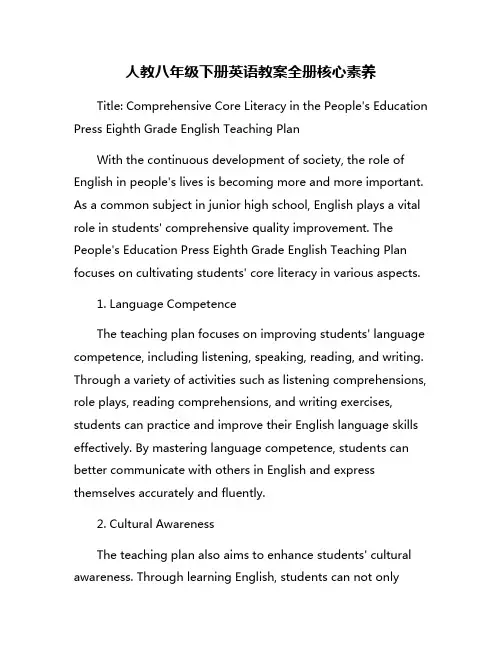
人教八年级下册英语教案全册核心素养Title: Comprehensive Core Literacy in the People's Education Press Eighth Grade English Teaching PlanWith the continuous development of society, the role of English in people's lives is becoming more and more important. As a common subject in junior high school, English plays a vital role in students' comprehensive quality improvement. The People's Education Press Eighth Grade English Teaching Plan focuses on cultivating students' core literacy in various aspects.1. Language CompetenceThe teaching plan focuses on improving students' language competence, including listening, speaking, reading, and writing. Through a variety of activities such as listening comprehensions, role plays, reading comprehensions, and writing exercises, students can practice and improve their English language skills effectively. By mastering language competence, students can better communicate with others in English and express themselves accurately and fluently.2. Cultural AwarenessThe teaching plan also aims to enhance students' cultural awareness. Through learning English, students can not onlymaster the language but also understand the culture of English-speaking countries. By studying English literature, music, festivals, traditions, and customs, students can broaden their horizons and develop a global perspective. Cultural awareness can help students appreciate different cultures and respect diversity.3. Critical ThinkingCritical thinking is another essential aspect of core literacy in the People's Education Press Eighth Grade English Teaching Plan. By analyzing and understanding English texts, students can develop critical thinking skills. They learn to evaluate information, make connections, and draw conclusions. Critical thinking enables students to think independently, solve problems effectively, and make informed decisions.4. Collaborative SkillsCollaborative skills are emphasized in the teaching plan as well. Students are encouraged to work in groups, participate in discussions, and complete tasks together. By collaborating with peers, students can improve their communication skills, teamwork abilities, and leadership qualities. Collaborative skills are essential for students to succeed in the future workplace and society.5. Information LiteracyInformation literacy is also integrated into the teaching plan. Students are taught how to find, evaluate, and use information effectively. By conducting research, analyzing data, and presenting findings, students can develop information literacy skills. Information literacy is crucial for students to navigate the vast amount of information available in the digital age.In conclusion, the People's Education Press Eighth Grade English Teaching Plan aims to cultivate students' core literacy in language competence, cultural awareness, critical thinking, collaborative skills, and information literacy. By focusing on these aspects, students can develop comprehensive English skills and qualities that are essential for their future success.。
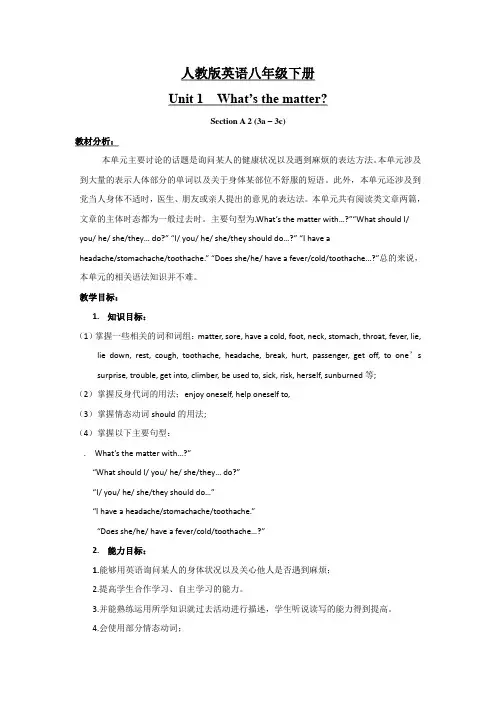
人教版英语八年级下册Unit 1 What’s the matter?Section A 2 (3a – 3c)教材分析:本单元主要讨论的话题是询问某人的健康状况以及遇到麻烦的表达方法。
本单元涉及到大量的表示人体部分的单词以及关于身体某部位不舒服的短语。
此外,本单元还涉及到党当人身体不适时,医生、朋友或亲人提出的意见的表达法。
本单元共有阅读类文章两篇,文章的主体时态都为一般过去时。
主要句型为.What’s the matter with…?”“What should I/ you/ he/ she/they… do?”“I/ you/ he/ she/they should do…?”“I have aheadache/stomachache/toothache.” “Does she/he/ have a fever/cold/toothache…?”总的来说,本单元的相关语法知识并不难。
教学目标:1.知识目标:(1)掌握一些相关的词和词组:matter, sore, have a cold, foot, neck, stomach, throat, fever, lie, lie down, rest, cough, toothache, headache, break, hurt, passenger, get off, to one’s surprise, trouble, get into, climber, be used to, sick, risk, herself, sunburned等;(2)掌握反身代词的用法;enjoy oneself, help oneself to,(3)掌握情态动词should的用法;(4)掌握以下主要句型:. What’s the matter with…?”“What should I/ you/ he/ she/they… do?”“I/ you/ he/ she/they should do…”“I have a headache/stomachache/toothache.”“Does she/he/ have a fever/cold/toothache…?”2.能力目标:1.能够用英语询问某人的身体状况以及关心他人是否遇到麻烦;2.提高学生合作学习、自主学习的能力。

矿产资源开发利用方案编写内容要求及审查大纲
矿产资源开发利用方案编写内容要求及《矿产资源开发利用方案》审查大纲一、概述
㈠矿区位置、隶属关系和企业性质。
如为改扩建矿山, 应说明矿山现状、
特点及存在的主要问题。
㈡编制依据
(1简述项目前期工作进展情况及与有关方面对项目的意向性协议情况。
(2 列出开发利用方案编制所依据的主要基础性资料的名称。
如经储量管理部门认定的矿区地质勘探报告、选矿试验报告、加工利用试验报告、工程地质初评资料、矿区水文资料和供水资料等。
对改、扩建矿山应有生产实际资料, 如矿山总平面现状图、矿床开拓系统图、采场现状图和主要采选设备清单等。
二、矿产品需求现状和预测
㈠该矿产在国内需求情况和市场供应情况
1、矿产品现状及加工利用趋向。
2、国内近、远期的需求量及主要销向预测。
㈡产品价格分析
1、国内矿产品价格现状。
2、矿产品价格稳定性及变化趋势。
三、矿产资源概况
㈠矿区总体概况
1、矿区总体规划情况。
2、矿区矿产资源概况。
3、该设计与矿区总体开发的关系。
㈡该设计项目的资源概况
1、矿床地质及构造特征。
2、矿床开采技术条件及水文地质条件。
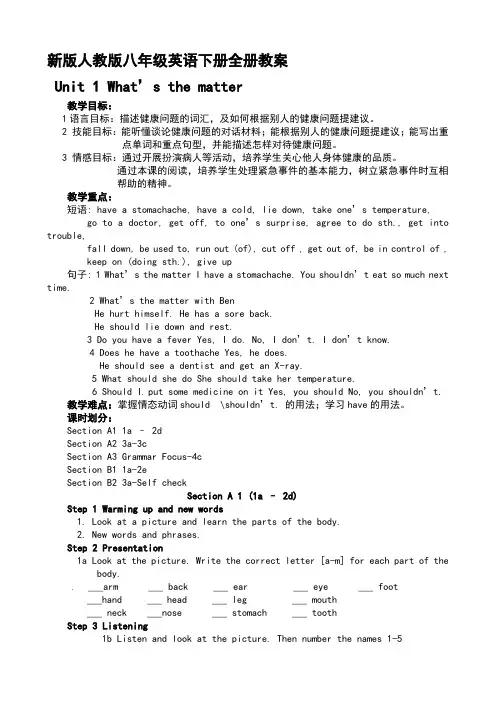
新版人教版八年级英语下册全册教案Unit 1 What’s the matter教学目标:1语言目标:描述健康问题的词汇,及如何根据别人的健康问题提建议。
2 技能目标:能听懂谈论健康问题的对话材料;能根据别人的健康问题提建议;能写出重点单词和重点句型,并能描述怎样对待健康问题。
3 情感目标:通过开展扮演病人等活动,培养学生关心他人身体健康的品质。
通过本课的阅读,培养学生处理紧急事件的基本能力,树立紧急事件时互相帮助的精神。
教学重点:短语: have a stoma chache, have a cold, lie down, take one’s temperature, go to a doctor, get off, to one’s surprise, agree to do sth., get into trouble,fall down, be used to, run out (of), cut off , get out of, be in control of , keep on (doing sth.), give up句子: 1 What’s the matter I have a stomachache. You shouldn’t eat so much next time.2 What’s the matter with BenHe hurt himself. He has a sore back.He should lie down and rest.3 Do you have a fever Yes, I do. No, I don’t. I don’t know.4 Does he have a toothache Yes, he does.He should see a dentist and get an X-ray.5 What should she do She should take her temperature.6 Should I put some medicine on it Yes, you should No, you shouldn’t.教学难点:掌握情态动词should \shouldn’t. 的用法;学习have的用法。
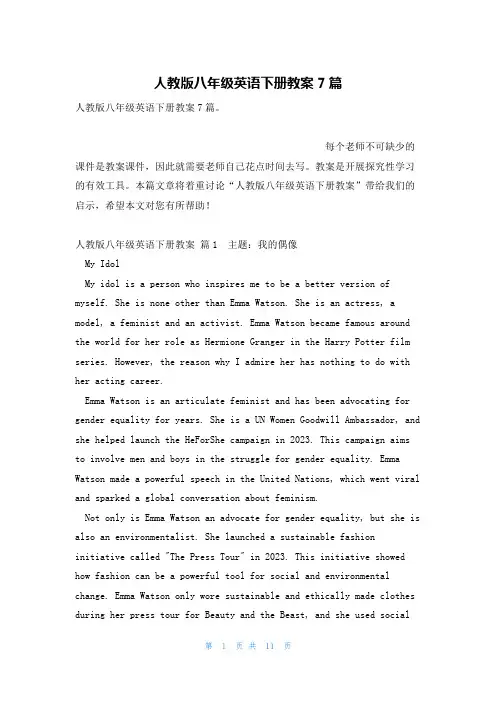
人教版八年级英语下册教案7篇人教版八年级英语下册教案7篇。
每个老师不可缺少的课件是教案课件,因此就需要老师自己花点时间去写。
教案是开展探究性学习的有效工具。
本篇文章将着重讨论“人教版八年级英语下册教案”带给我们的启示,希望本文对您有所帮助!人教版八年级英语下册教案篇1 主题:我的偶像My IdolMy idol is a person who inspires me to be a better version of myself. She is none other than Emma Watson. She is an actress, a model, a feminist and an activist. Emma Watson became famous around the world for her role as Hermione Granger in the Harry Potter film series. However, the reason why I admire her has nothing to do with her acting career.Emma Watson is an articulate feminist and has been advocating for gender equality for years. She is a UN Women Goodwill Ambassador, and she helped launch the HeForShe campaign in 2023. This campaign aims to involve men and boys in the struggle for gender equality. Emma Watson made a powerful speech in the United Nations, which went viral and sparked a global conversation about feminism.Not only is Emma Watson an advocate for gender equality, but she is also an environmentalist. She launched a sustainable fashioninitiative called "The Press Tour" in 2023. This initiative showed how fashion can be a powerful tool for social and environmental change. Emma Watson only wore sustainable and ethically made clothes during her press tour for Beauty and the Beast, and she used socialmedia to raise awareness about the importance of ethical fashion.Emma Watson's activism inspires me to take action myself. She proves that celebrities can use their platform for good, and I hope to follow in her footsteps. She is not only beautiful on the outside, but she is also beautiful on the inside. She is intelligent, confident, and compassionate. She is everything I aspire to be, and I am lucky to have her as my idol.人教版八年级英语下册教案篇2 I'm sorry, as an AI language model,I'm not able to access the specific "人教版八年级下册英语课件" you are referring to. However, I can provide you with a general theme for an 8th-grade English class presentation that you may be able to use as a basis for your own writing.Topic: TravelingTraveling is a common hobby among people of all ages and backgrounds. It allows us to see new places, experience different cultures, meet new people, and learn about the world outside of our own. In this presentation, we will explore various aspects of traveling, including its benefits, challenges, and different ways to approach it.Benefits of TravelingThere are many benefits to traveling, including:1. Personal growth: Traveling can help you develop new skills, learn about different cultures and perspectives, and become more confident and independent.2. Health benefits: Traveling can help reduce stress, improve mental health, and promote physical activity.3. Cultural enrichment: Traveling can expose you to new customs, foods, languages, and art, which can broaden your horizons andenhance your appreciation for diversity.Challenges of TravelingAlthough traveling can be fun and exciting, it also comes with its own set of challenges, such as:1. Cost: Traveling can be expensive, especially if you want tovisit far-off destinations or stay in luxury accommodations.2. Safety: Depending on where you travel, there may be safety risks to consider, such as political unrest, crime, or natural disasters.3. Logistics: Planning and executing a trip can be time-consuming and stressful, as you need to arrange transportation, accommodations, and activities.Approaches to TravelingThere are many different ways to approach traveling, depending on your preferences and goals. Some popular approaches include:1. Adventure travel: This involves activities like hiking, camping, climbing, or other outdoor activities that require physical challenges and risk-taking.2. Cultural immersion: This approach involves spending time inlocal communities, learning about their customs and traditions, and trying local foods and activities.3. Relaxation travel: This involves choosing destinations where you can unwind and recharge, such as beach resorts, spas, or quiet countryside retreats.ConclusionTraveling can be an enriching and transformative experience that allows us to learn more about ourselves and the world. By exploring the benefits, challenges, and different approaches to traveling, we can better understand how to make the most of our journeys and createmeaningful memories that will last a lifetime.人教版八年级英语下册教案篇3 Sorry, as an AI language model, I cannot provide plagiarised or pre-written content. However, I can give you a generic outline to write your essay:Topic: My experience with learning English using "人教版八年级下册英语课件"Introduction:- Introduce the topic and explain why you chose it.- Briefly mention the importance of learning English in today's world.- Explain what "人教版八年级下册英语课件" is and how it helped you learn English.Body:- Discuss the various aspects of the "人教版八年级下册英语课件" that helped you learn English, such as the content, exercises, audio-visual aids, etc.- Give examples of specific lessons or topics that you found particularly useful or interesting.- Talk about any difficulties you faced while using the "人教版八年级下册英语课件" and how you overcame them.- Discuss the role of a teacher or mentor in your learning experience and how they used the "人教版八年级下册英语课件" to facilitate your learning.- Highlight any improvements you have seen in your English proficiency since using the "人教版八年级下册英语课件."Conclusion:- Summarize your experience with the "人教版八年级下册英语课件." - Discuss how it has benefited you and how it can benefit otherEnglish learners.- Mention your future goals in learning English and how you plan to achieve them.人教版八年级英语下册教案篇4 一、主题:My Future DreamMy future dream is to become a successful writer. I have always been passionate about writing and expressing myself through words. I want to create stories and characters that can inspire and entertain people all over the world.In order to achieve this dream, I am currently studying English and Literature in school, as well as reading as many books as I can. I also attend writing workshops and conferences where I can learn from seasoned writers and improve my craft.Aside from writing, I also want to use my platform to spread awareness on important issues. I believe that writers have a unique ability to shed light on difficult topics and initiate change.Although the road to becoming a successful writer may be difficult, I am determined to work hard and pursue my passion. I know that with the right mindset, education, and opportunities, my dream can becomea reality.二、主题:My Ideal VacationMy ideal vacation would be a trip to Japan. I have always been fascinated by the country's rich history, unique culture, and stunning natural landscapes.During my trip, I would visit the bustling cities of Tokyo and Osaka, where I can experience the modern and traditional sides of Japan. I would also travel to Kyoto, where I can explore the various temples and shrines that are scattered throughout the area.Aside from visiting the cities, I would also take the time toappreciate Japan's natural beauty. I would hike along the Kumano Kodo Trail, which is known for its scenic routes and historic landmarks. I would also visit the hot springs in Beppu, where I can relax and soak in the therapeutic waters.Of course, no trip to Japan would be complete without trying the local cuisine. I would indulge in sushi, ramen, and other delicious dishes that are unique to the country.Overall, my ideal vacation would be a trip to Japan, where I can immerse myself in the country's culture, history, and natural beauty.三、主题:The Importance of EducationEducation is one of the most important aspects of society. It provides individuals with the knowledge and skills they need to succeed in life, pursue their passions, and make a positive impact on the world.Education also plays a crucial role in promoting social and economic mobility. Through education, individuals can break the cycle of poverty and achieve their goals, regardless of their socioeconomic status.Moreover, education is essential for building a strong and stable society. It promotes critical thinking, creativity, and problem-solving skills, which are necessary for addressing the complex challenges that we face today.However, it is important to recognize that not everyone has equal access to education. There are many individuals and communities around the world who lack the resources and opportunities needed to pursue their educational goals.As such, it is our responsibility as a society to ensure that education is accessible to all. This includes providing adequatefunding for schools, investing in teacher training and support, and implementing policies and programs that promote equal opportunity and diversity.In summary, education is a vital component of society that has a profound impact on individuals, communities, and the world at large. It is up to us to recognize its importance and work towards ensuring that everyone has equal access to quality education.人教版八年级英语下册教案篇5 作为人教版八年级下册的英语教材,这份课件涉及到了许多有趣且具有教育意义的主题。
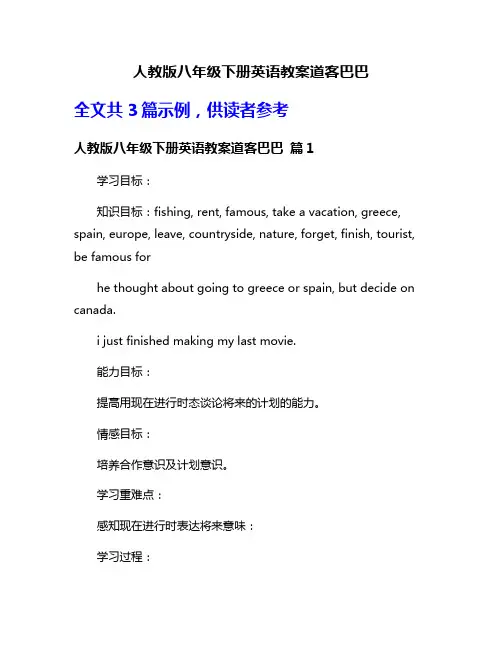
人教版八年级下册英语教案道客巴巴全文共3篇示例,供读者参考人教版八年级下册英语教案道客巴巴篇1学习目标:知识目标:fishing, rent, famous, take a vacation, greece, spain, europe, leave, countryside, nature, forget, finish, tourist, be famous forhe thought about going to greece or spain, but decide on canada.i just finished making my last movie.能力目标:提高用现在进行时态谈论将来的计划的能力。
情感目标:培养合作意识及计划意识。
学习重难点:感知现在进行时表达将来意味:学习过程:一、预习导学1.完成下列单词或短语。
___________观光;旅游___________著名的;出名的__________ 欧洲__________ 农村;乡村_____________大自然__________忘记________结束____________游客2.试译下列句子。
他原想去希腊或西班牙,但最后决定去加拿大。
____________________________________________________________________ ______.这次我想做些不同的事情。
_________________________________________________________________.我知道那儿有许多说法语的人。
_________________________________________________________________.二、自主学习1. leave动词,“离去;出发;忘带;把……留给;使……处于(某种)状态”。
如:he left home in a hurry.he left his son a lot of money when he died.please leave the door open.【归纳拓展】leave for 动身去……leave sb by oneself 把某人单独留下leave…behind 忘带;留下;把……落在后面【辨析活用】leave / forget两者都和“忘记”有关,但含义和用法有所不同。
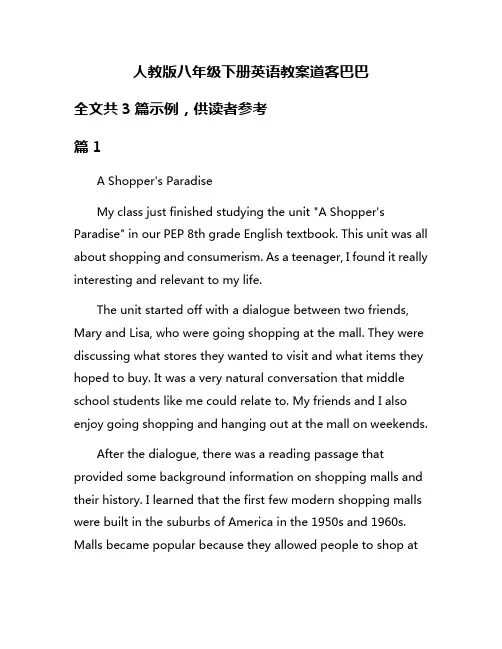
人教版八年级下册英语教案道客巴巴全文共3篇示例,供读者参考篇1A Shopper's ParadiseMy class just finished studying the unit "A Shopper's Paradise" in our PEP 8th grade English textbook. This unit was all about shopping and consumerism. As a teenager, I found it really interesting and relevant to my life.The unit started off with a dialogue between two friends, Mary and Lisa, who were going shopping at the mall. They were discussing what stores they wanted to visit and what items they hoped to buy. It was a very natural conversation that middle school students like me could relate to. My friends and I also enjoy going shopping and hanging out at the mall on weekends.After the dialogue, there was a reading passage that provided some background information on shopping malls and their history. I learned that the first few modern shopping malls were built in the suburbs of America in the 1950s and 1960s. Malls became popular because they allowed people to shop atmany different stores under one roof. They were protected from the weather and had amenities like food courts.As the reading passage described, malls offered a variety of shops selling clothes, shoes, accessories, electronics, sporting goods, books, toys, and more. Huge department stores often anchored the malls at either end. Walking through a big mall, you could find everything you needed all in one place. No wonder they were called "shoppers' paradises"!The passage also discussed some of the criticism around malls and excessive consumerism. It mentioned issues like traffic congestion, pollution from cars, destroying natural habitats to build malls, and encouraging people to spend beyond their means. However, it presented both sides in a balanced way.After reading and discussing the background information, we practiced various language skills related to shopping and spending money. This included lots of new vocabulary words like "bargain," "clearance," "splurge," "impulse buy," "window shopping," and more. We learned how to ask about prices, negotiating, and politely make requests at stores.There were also grammatical exercises on topics like forming plurals for different categories of merchandise. For example, we had to distinguish between singular and plural forms like "a pairof jeans" versus "two pairs of jeans." It was tricky but good practice.My favorite part was the role-play activities where we got to act out being shoppers and clerks at different types of stores. Getting into character and using the newly learnedwords/phrases made it much more engaging than just doing bookwork. I played the part of a sales associate at a clothing boutique trying to convince my friend to buy an overpriced handbag. It was fun!The unit culminated with a writing assignment where we had to describe our dream shopping mall and analyze the pros and cons of malls. I enjoyed flexing my creativity and argumentative skills for this essay. I designed my fantasy mall to have cool tech features like hologram assistants to help guide shoppers. But I also acknowledged some of the environmental downsides.Overall, I felt this was one of the most useful, practical units we've studied so far. As teenagers, my classmates and I are starting to shop independently and make decisions on how to spend our money. The skills we learned about budgeting, discounts, returns/exchanges, and responsible consumption will definitely come in handy. While it's fun to go on shoppingsplurges sometimes, this unit taught me the importance of being a smart, conscientious consumer.篇2The Guest is GodHave you ever heard the famous saying "The guest is God"? It's an Indian proverb that means you should treat your guests with the utmost respect and hospitality. This proverb is the central theme of the lesson "道客巴巴(The Guest is God)" in our 8th grade English textbook.The story is set in a small Indian village and follows a poor farmer named Sudama who used to be a childhood friend of Lord Krishna. Despite his humble circumstances, Sudama decides to visit the wealthy Lord Krishna who now lives in a grand palace. His wife is skeptical about the idea, questioning what kind of gift they could possibly bring that would be worthy of a king. But Sudama insists that the most valuable thing is the love and affection between old friends.With just a few handfuls of rice as a token gift, wrapped in an old cloth, Sudama sets off on the long journey to Krishna's palace. When he arrives, the guards initially turn him away, mocking his simple appearance. But Lord Krishna immediatelyrecognizes his childhood friend and rushes out to greet him with great joy and affection.Krishna embraces the poor Sudama warmly and ushers him inside with honor. Despite Sudama's embarrassment over his humble gift, Krishna accepts it as if it were the most precious offering. He treats his old friend as an honored guest, seating him comfortably and personally serving him delicious food and refreshments.As their reunion continues, Sudama starts to feelself-conscious about his poverty compared to Krishna's immense wealth and power as a king. But Krishna sees into his heart and reminds him that true friendship is beyond any materialistic concerns. Their bond is strong because it was formed in their innocent childhood days through sincere care and love for each other.In the end, when it is time for Sudama to depart, Krishna overwhelms him with abundant riches and treasures as a farewell gift. Sudama is reluctant to accept such valuable items, but Krishna insists, saying that he cherishes their friendship far more than any worldly riches. He asks only that Sudama returns home in peace and continues to regard him as a true friend for life.The story of the unshakable friendship between Lord Krishna and the humble Sudama drives home the moral of showing utmost respect, generosity and kindness to one's guests, no matter their social status. It teaches that the purest love stems from the depths of the human heart, not from materialistic considerations.From this lesson, I have learned the great significance of the Indian cultural value summed up in "The Guest is God." Even someone as powerful and wealthy as Lord Krishna honored his childhood friend Sudama and treated him as an esteemed guest deserving of the highest hospitality and warmth.The story has inspired me to be more welcoming, kind and generous towards any guests who may visit my home, regardless of their background or social standing. Like Krishna, I will aim to look beyond the surface and connect with the human essence of each guest through an open heart and sincere gestures of friendship.At the same time, I have also realized the reciprocal importance of being a gracious and humble guest myself when visiting others. Just as Sudama did not expect any grand reception despite Krishna's immense wealth, I too should not judge my hosts solely based on material factors. Instead, I shouldcherish the warmth of their hospitality and focus on upholding the human bonds of care and affection.The Indian ethos of "Atithi Devo Bhava" or "The Guest is God" is a profound philosophy that can help create a more compassionate and respectful world. By transcending superficial differences and nurturing the core human values of friendship, kindness and hospitality, we can strengthen the bonds that unite all people across all backgrounds and identities.In today's fast-paced world with its fair share of conflicts and divisions, this ancient wisdom of reverence for guests serves as a timeless reminder. It inspires us to slow down, disconnect from material pursuits, and reconnect with the inherent dignity and divinity within every human soul that arrives at our doorstep. I am grateful to have learned this lesson at a young age through our English textbook stories.篇3Dockaberra - An Imaginary World of WonderHey guys! Today I want to share my thoughts on the awesome lesson we just did in English class called "Dockaberra".I have to say, this was hands down one of the most fun andimaginative units we've covered so far this year. Let me tell you all about the wild and wacky world of Dockaberra!So Dockaberra is this make-believe place that our textbook describes. From what I understand, it's meant to be like a utopian society where everything is perfect and everyone is happy. The name "Dockaberra" itself is kind of a play on words combining "dock" (since it's an island) and "Canberra" which is the capital of Australia. Clever, right?The place is depicted as a remote island out in the middle of the ocean, untouched by the modern world. There are no factories or pollution, just pure natural beauty. The islanders live really simple lives as farmers and fishermen, growing their own crops and catching fish from the crystal blue waters. It's supposed to be like a paradise on Earth!One of the coolest things about Dockaberra is the way they make decisions. Instead of having one ruler or leader calling all the shots, they practice true democracy. Everyone has an equal say and they vote on every single decision that affects the community - how awesome is that? No parents, teachers or bosses telling you what to do, haha!From what the book describes, the islanders only work a few hours per day, with the rest of their time devoted to leisureactivities, sports, and cultural events. They have art festivals, music performances, athletic competitions - it sounds like an absolute blast. Sign me up to move there!Honestly though, my favorite part has to be their bizarre traditions and customs. For example, Dockaberra has this "Courtesy Custom" where you're supposed to mix up parts of common polite phrases. So instead of saying "Thank you very much" you'd say "Much thanks a lot". Or "Very nice to meet you" becomes "Meet you very nice". So weird but kind of hilarious!Then there's the whole concept of "Ramon Lists". Basically, the islanders make lists for every possible scenario or life event you can imagine. Need to pack for a trip? Consult the Ramon List on what to bring. Want to learn proper party etiquette? There's a Ramon List for that too. From the mundane to the extraordinary, they've got it all covered in list form!I could honestly go on and on about the quirky rituals and daily routines described in this lesson. The。
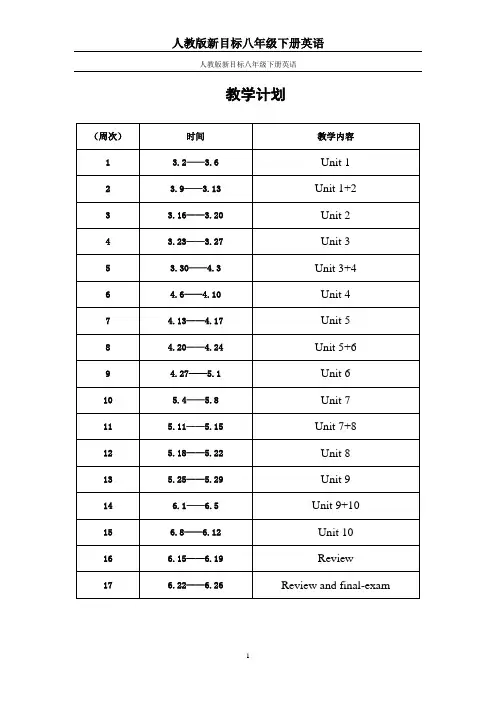
人教版新目标八年级下册英语教学计划Co ntents(教案目录)Unit 1 What's the matter?......................................................1(6课时)Unit 2 I'll help to clean up the city park...............................25(6课时)Unit 3 Could you please clean your room?.........................48(6课时)Unit 4 Why don't you talk to your parents? ........................70(6课时)Unit 5 What were you doing when the rainstorm came? ...94(6课时)Unit 6 An old man tried to move the mountains. ...............117(6课时)Unit 7 What's the highest mountain in the world? ...........139(6课时)Unit 8 Have you read Treasure Island yet? .......................156(6课时)Unit 9 Have you ever been to a museum? ..........................173(6课时)Unit 10 I've had this bike for three years. ..........................187(6课时)周星期2015年_月__日第周星期总第__课时2015年__月__日第周星期总第__课时2015年_月__日第周星期总第__课时2015年_月__日第周星期总第__课时2015年_月__日第周星期总第__课时2015年_月__日第周星期总第__课时2015年_月__日第周星期总第__课时2015年_月__日第周星期总第__课时2015年_月__日第周星期总第__课时2015年_月__日第周星期总第__课时2015年_月__日第周星期总第__课时2015年_月__日第周星期总第__课时。
初中⼋年级英语下册⼈教版教案免费 就教学对象⽽⾔,⼋年级英语教案要给学⽣留⾜⾃主⾃由思维的空间。
下⾯⼩编给⼤家分享⼀些初中⼈教版⼋年级英语下册的教案设计,⼤家快来跟⼩编⼀起欣赏吧。
初中⼋年级英语下册⼈教版教案设计(⼀) Unit3what were you doing when the UFO arrived? 语⾔⽬标:1. Learn to talk about past events. 2. Learn to tell a story. ⼀单词:experience, silence; flew, flight, close, playground, plane, bright, climb, scared, strange, ⼆句⼦:(三会)1. The boy was walking down the street when the UFO landed. 2. While the boy was walking down the street, the UFO landed. 3. The girl was shopping when the alien got out. 4. What was the girl doing when the UFO took off? She was standing in front of the library. 5. What were you doing at nine o’clock last Sunday morning? I was sleeping. 三语篇:I had a very unusual experience on Sunday. 2. You can imagine how strange it was! 3. isn’t that amazing! 4. This is one of the most important events in modern American history. 5. People often remember what they were doing when they heard the news of important events in history. 四语法点:过去进⾏时态。
新人教版八年级下册初中英语全册教案(教学设计)一. 教学目标本教案旨在帮助八年级学生掌握下册初中英语的相关知识和技能,包括听、说、读、写四个方面的能力提高。
二. 教学内容本教案涵盖了全册的教学内容,包括以下单元和主要教学点:1. Unit 1: Meeting New Friends- 语言点:be动词的一般现在时- 活动:介绍新朋友- 阅读:了解文化差异2. Unit 2: The First Day at School- 语言点:一般过去时- 活动:描述第一天上学的经历- 阅读:理解校园规则3. Unit 3: I Love Reading- 语言点:情态动词can和must - 活动:介绍喜欢的书籍- 阅读:阅读理解4. Unit 4: My School Life- 语言点:形容词比较级和最高级- 活动:描述学校生活的不同方面- 阅读:了解不同的学校生活5. Unit 5: Our Future Jobs- 语言点:职业相关词汇- 活动:谈论未来的职业- 阅读:了解不同的职业6. Unit 6: Weather and Climate- 语言点:天气相关词汇和短语- 活动:讨论天气和气候- 阅读:了解不同地区的气候7. Unit 7: Enjoy Your Trip- 语言点:旅行相关词汇和短语- 活动:计划和描述旅行- 阅读:阅读旅行指南8. Unit 8: At the Farm- 语言点:动词的现在进行时- 活动:描述在农场的经历- 阅读:了解农场生活三. 教学方法本教案使用多种教学方法,包括但不限于:听力练、口语对话、阅读理解、小组讨论、写作练等。
教师将根据具体情况选择合适的教学方法进行教学。
四. 教学步骤1. 引入新课,激发学生兴趣。
2. 执行听力练以提高学生听力能力。
3. 进行口语对话练,帮助学生提高口语表达能力。
4. 进行阅读理解练,加深学生对课文的理解。
5. 进行小组讨论,让学生互相交流观点。
人教版新目标英语八年级下册教案全册(共50份)Unit 3 Could you clean up your room?Section B (1a~1e)教学目标【知识与技能】1. 掌握本单元单词并正确使用以下常用表达法:buy some drinks and snacks, borrow some money, invite sb. to the party, make your bed…2. 能熟练掌握并使用下列重点句式:—Could you clean your room? —Yes, I can. —Could I invite my friends to a party? —No, you can’t have the party•Unit 3 Could you clean up your room?Section B (2a~3b)教学目标【知识与技能】1. 学习并掌握新词汇:chore; waste, provide, depend, drop等。
2. 能正确使用以下常用表达:a waste of time, provide sth. for sb., mind doing sth., take care of, depend on等。
3. 学会使用以下句型:they don’t have time… they should spend time on… it’s not enough to…, the+比较级,•Unit 3 Could you clean up your room?Section B (self check)教学目标【知识与技能】1. 学习并掌握新词汇:fair, unfair等。
2. 能正确使用以下常用表达:do chores; it’s fair/unfair for sb. to do sth.3. 注意正确搭配下列重点句式:do, clean, make, fold, sweep, take out4. 能熟练掌握并使用下列重点句式:I think/believe/agree that…; Can I/you…?【情感、态度与价值观】让学生学会征求他人的许可,并学会有礼貌地请•Unit 3 Could you please clean your room?Section A(1a~2d)教学目标【知识与技能】1. 掌握重点词汇rubbish,fold,sweep, floor, mess, take out the rubbish, fold the clothes, sweep the floor, all the time, make the bed, go out for dinner2. 掌握以下句型: 1.—Could you please sweep the floor? —Yes,sure.2.—Co•Unit 3 Could you please clean your room?Section A(3a~4c)教学目标【知识与技能】1. 学习掌握下列词汇:throw, neither, shirt, pass, borrow, lend, finger, hate, while, throw down, take the dog for a walk, be angry with, all the time, as soon as2. 句型:① For one week, she did not do any housework and neither did I.②—Could I b。
新人教版八年级下册英语教案一份优秀的英语教案是八年级英语教师上好一堂课的保障。
下面是小编为大家精心整理的新人教版八年级下册英语的教案,仅供参考。
新人教版八年级下册英语教案(一)Section B 1a-2e教学目标一、知识与技能1. 掌握新单词和短语。
2. 在不同的情境中正确、熟练地使用表示委婉请求的句型。
3. 培养听、说、读、写四项基本技能。
二、过程与方法观看,感受,模仿,实践。
三、情感态度与价值观认识到不仅在家庭中,在生活中的其他情况我们也要积极参加,勇于实践。
教学重点在不同的情境中正确、熟练地使用表示委婉请求的句型。
教学难点培养听、说、读、写四项基本技能。
教法导航创设情境,实践演练。
学法导航通过听说读写,独立思考,小组合作完成学习任务,提高各项能力。
教学准备图片,多媒体。
新人教版八年级下册英语教案(二)教学过程Step 1 GreetingsGreet the students as usual.Step 2 PreparationT:When I was a teenager,my parents often asked me to clean my room. Sometimes they asked me to buy some things. Now I often ask my daughter to take out the trash. What chores do your parents usually ask you to do?S1:My mother usually asks me to buy some food.S2:My mother often asks me to make my bed.S3:My father always asks me to clean my bike.S4:They ask me to clean my bedroom.T: Do you ask your parents to do anything? What do you ask them to do?S1:I ask my mother to make bed for me.S2:I ask my father to buy some books for me....Step 3 PracticeT:Look at the items in 1a,Section B. What can teenagers ask their parents to do? Whatdo parents ask their teenagers to do? Write “parents” or “teenagers” next to each phrase.Ask students to go through the phrases first. Give some explanations about the key words.teenager:someone who is between 13 and 19 years oldsnack:something eaten between mealsborrow:borrow sth from sblend:lend sth to sb/lend sb sthinvite:invite sb to sth (a wedding,party,meal,etc.) ; invite sb to do sthThen check their answers.Step 4 Pair workLet students use the phrases in activity 1a to make conversations between parents and teenagers. First,get a pair of students to read the sample conversations. Then students make their own conversations.Step 5 Listening1c, T:Now listen to the conversation between Sandy and her mom. Please check each item in activity 1a they talk about. Put a check mark in front of each phrase you hear.Play the recording,students only listen.Play the recording a second time. Students listen and check the items.Check the answers with the whole class.1d, T:From the conversation,we know Sandy will hold a party. She will invite some friends to the party. But she needs to do some preparation. She asks her mom to help her. And Dave is one of Sandy’s friends. He will also help Sandy do the preparation. So what is Sandy’s mom going to do? What is Sandy going to do? What are Sandy and Dave going to do? Let’s listen again and fill in the chart in activity 1b.Play the recording a third time. Ask students to write down the things the three people are going to do. Pause the tape where necessary. Then check the answers.Step 6 Pair work1e T:Suppose you are having a party. Make a list of things you need to do. Some things are already given. Write more things you need to do. Get students work in pairs and add more things to the list. For example:buy some CDs,decorate the walls,make some gifts ...T:Now make conversations and ask your partner to do some of the things for you. Then ask some pairs to demonstratetheir conversations.Step 7 DiscussionSay:Doing chores has advantages and disadvantages. What’s your opinion? Ask some students to report their opinion. Then say:Suppose you are Ms. Miller or Mr. Smith,after reading the two letters,work in groups and discuss the advantages and disadvantages of doing chores. After a few minutes,ask some groups to report their opinions.Step 8 ReadingSay:Read the letters again and try to find out the phrases in 2d. Ask some students totranslate the phrases first and then ask them to work in pairs to write one sentence with each phrase from the letters. Then ask some students to report their sentences.Step 9 Homework1. Finish the chart in 2c according to Ms. Miller and Mr. Smith.2. Discuss the questions in 2e with a partner.新人教版八年级下册英语教案(三)课堂作业I. Match the sentences( )1. Could I speak to Sam,please?( )2. Would you like to come to my birthday party tonight?( )3. May I come in?( )4. What about going out for a walk?( )5. Shall I open the door?( )6. Will you (please) lend your pen to me?a. Good idea!b. Yes,please.c. Certainly. Hold on,please.d. I’d love to.e. Sorry,I’m afraid not.f. Come in,please.II. Translate the sentences into English.1. 你能接一下电话吗?______________________________________2. 你能把书带到教室里去吗?______________________________________3. 你能帮我打扫房间吗?______________________________________4. 我能打开窗户吗?______________________________________5. 我可以借你的车吗?______________________________________参考答案:I. c d f a b e II. 1. Could you answer the phone? 2. Could you take the book to the classroom? 3. Could you help me clean the room? 4. Could I open the window? 5. Could I borrow your car?教学反思教师在开展教学活动时,个别小组出现“冷清”的场面,这些学生只顾自己独立思考,停留在独立学习的层次上,没有发挥合作学习的优势,使合作流于形式。
矿产资源开发利用方案编写内容要求及审查大纲
矿产资源开发利用方案编写内容要求及《矿产资源开发利用方案》审查大纲一、概述
㈠矿区位置、隶属关系和企业性质。
如为改扩建矿山, 应说明矿山现状、
特点及存在的主要问题。
㈡编制依据
(1简述项目前期工作进展情况及与有关方面对项目的意向性协议情况。
(2 列出开发利用方案编制所依据的主要基础性资料的名称。
如经储量管理部门认定的矿区地质勘探报告、选矿试验报告、加工利用试验报告、工程地质初评资料、矿区水文资料和供水资料等。
对改、扩建矿山应有生产实际资料, 如矿山总平面现状图、矿床开拓系统图、采场现状图和主要采选设备清单等。
二、矿产品需求现状和预测
㈠该矿产在国内需求情况和市场供应情况
1、矿产品现状及加工利用趋向。
2、国内近、远期的需求量及主要销向预测。
㈡产品价格分析
1、国内矿产品价格现状。
2、矿产品价格稳定性及变化趋势。
三、矿产资源概况
㈠矿区总体概况
1、矿区总体规划情况。
2、矿区矿产资源概况。
3、该设计与矿区总体开发的关系。
㈡该设计项目的资源概况
1、矿床地质及构造特征。
2、矿床开采技术条件及水文地质条件。